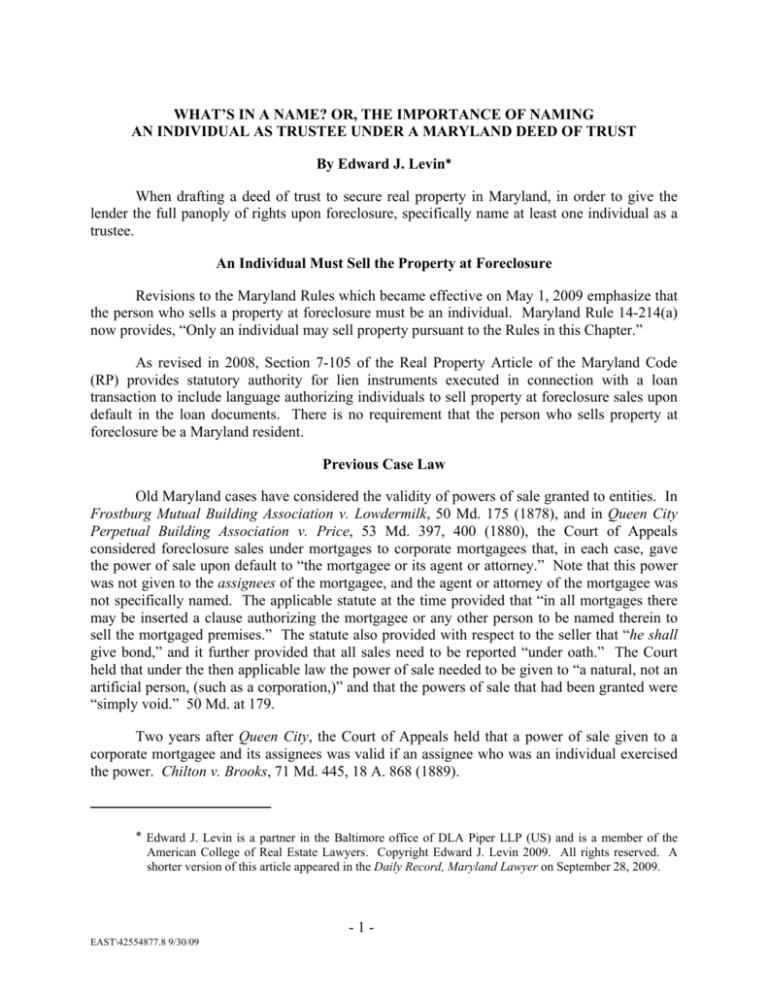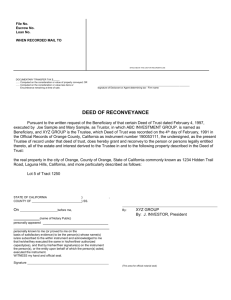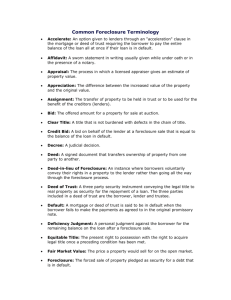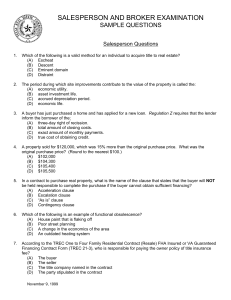
WHAT’S IN A NAME? OR, THE IMPORTANCE OF NAMING
AN INDIVIDUAL AS TRUSTEE UNDER A MARYLAND DEED OF TRUST
By Edward J. Levin∗
When drafting a deed of trust to secure real property in Maryland, in order to give the
lender the full panoply of rights upon foreclosure, specifically name at least one individual as a
trustee.
An Individual Must Sell the Property at Foreclosure
Revisions to the Maryland Rules which became effective on May 1, 2009 emphasize that
the person who sells a property at foreclosure must be an individual. Maryland Rule 14-214(a)
now provides, “Only an individual may sell property pursuant to the Rules in this Chapter.”
As revised in 2008, Section 7-105 of the Real Property Article of the Maryland Code
(RP) provides statutory authority for lien instruments executed in connection with a loan
transaction to include language authorizing individuals to sell property at foreclosure sales upon
default in the loan documents. There is no requirement that the person who sells property at
foreclosure be a Maryland resident.
Previous Case Law
Old Maryland cases have considered the validity of powers of sale granted to entities. In
Frostburg Mutual Building Association v. Lowdermilk, 50 Md. 175 (1878), and in Queen City
Perpetual Building Association v. Price, 53 Md. 397, 400 (1880), the Court of Appeals
considered foreclosure sales under mortgages to corporate mortgagees that, in each case, gave
the power of sale upon default to “the mortgagee or its agent or attorney.” Note that this power
was not given to the assignees of the mortgagee, and the agent or attorney of the mortgagee was
not specifically named. The applicable statute at the time provided that “in all mortgages there
may be inserted a clause authorizing the mortgagee or any other person to be named therein to
sell the mortgaged premises.” The statute also provided with respect to the seller that “he shall
give bond,” and it further provided that all sales need to be reported “under oath.” The Court
held that under the then applicable law the power of sale needed to be given to “a natural, not an
artificial person, (such as a corporation,)” and that the powers of sale that had been granted were
“simply void.” 50 Md. at 179.
Two years after Queen City, the Court of Appeals held that a power of sale given to a
corporate mortgagee and its assignees was valid if an assignee who was an individual exercised
the power. Chilton v. Brooks, 71 Md. 445, 18 A. 868 (1889).
∗ Edward J. Levin is a partner in the Baltimore office of DLA Piper LLP (US) and is a member of the
American College of Real Estate Lawyers. Copyright Edward J. Levin 2009. All rights reserved. A
shorter version of this article appeared in the Daily Record, Maryland Lawyer on September 28, 2009.
-1EAST\42554877.8 9/30/09
Also of note is Maslin v. Marshall, 94 Md. 480, 486 (1902), in which the Court of
Appeals held that a power of sale, which was originally granted to individuals, did not become
void when it was transferred to a corporation before the mortgage was assigned to an individual
for foreclosure. See also Barroll v. Benton, 121 Md. 174, 88 A. 101 (1913), which held that a
power of sale exercised by a person who had multiple capacities under the mortgage, including a
valid power, was not objectionable even though the person purported to exercise the power in the
wrong capacity.
For a discussion of these cases, see Ginsberg and Ginsberg, MORTGAGES
LIENS IN MARYLAND (1936), Who May Exercise Power of Sale, at 388-389.
AND
OTHER
Lest one think that Maryland courts have not considered this issue for almost one
hundred years, in Whitworth v. Algonquin Associates, Inc., 75 Md. App. 479 at 483, 541 A.2d
1328 (1988), the Court of Special Appeals cited Frostburg M.B.A. and Queen City as still being
applicable.
Effect of the Current Law
The cases cited above dealt with mortgages, and not deeds of trust. I have not found a
case that challenged a power of sale under a deed of trust because there were no individual
trustees originally named. Trustees are typically not authorized to assign their interests, but
lenders almost always reserve the right to substitute trustees. If the law were the same today as it
was when the earlier cases were decided, perhaps a lender could name as the trustee under a deed
of trust an entity and its successors and provide for a power of sale to the trustee upon default. If
the instrument went into default, the lender could then substitute one or more individuals to serve
as trustee and foreclose the deed of trust. The substituted trustees might be regarded as
comparable to assignees of a mortgagee.
But current law is different. RP Section 7-105 states, “A provision may be inserted in a
mortgage or deed of trust authorizing any natural person named in the instrument, including the
secured party, to sell the property . . . ” [Emphasis added.] This permits a power of sale to be
given to an individual trustee who is named in a deed of trust, a mortgagee who is a natural
person, or an attorney who is named as having a power of sale. However, on its face the statute
does not authorize a power of sale if it is granted only to an entity or to an entity and its
successors or assigns. It is therefore prudent to name an individual as a trustee under a deed of
trust in order to assure that the lender will have a power of sale upon default.
Many lenders like to name a title company or other entity as the trustee under their deeds
of trust, recognizing that they must substitute an individual as trustee if the deed of trust goes
into default and they want to foreclose. Trustees may take certain action before foreclosure, such
as executing releases and appearing in condemnation proceedings. If a lender feels that it is
important to have an entity serve as trustee before foreclosure, the lender can name both an
individual trustee and a corporate trustee in the deed of trust. Under the holding in Maslin v.
Marshall mentioned above, the lender could name an individual trustee originally and then
replace that person with an entity. If the property goes to foreclosure, the lender could substitute
the trustee again, naming an individual. Under current law, however, lenders who only name
corporate trustees may not have a valid power of sale under their deeds of trust.
-2EAST\42554877.8 9/30/09
What if There is No Power of Sale?
Maryland real estate practitioners typically employ powers of sale when they foreclose.
In order to initiate a power of sale foreclosure, counsel for the lender files an order to docket suit
in the circuit court where the property is located. See Rule 14-207(a)(1). A second summary
foreclosure procedure under Maryland law exists when an “assent to decree” clause is included
in the mortgage or deed of trust. “Assent to decree” means “consent to an order.” Pursuant to
Rule 14-207(a)(2), for an assent to decree foreclosure, instead of filing an order to docket suit,
counsel for the lender files a complaint to foreclose. Under an assent to decree case, the circuit
court will sign an order authorizing one or more individual trustees to sell the property at a
public sale before affording the mortgagor notice or the opportunity to object. See Rule 14-207.
After the initial pleadings are filed, power of sale and assent to decree foreclosures proceed in
the same way. See Rules 14-210, 14-213, 14-214, and 14-215.
What if There is No Power of Sale or Assent to Decree?
If the security instrument does not contain a clause authorizing a power of sale (or if the
power of sale is void) and does not contain an assent to decree clause, the lender may still
foreclose the instrument. Such an action is commenced by filing a complaint to foreclose, but
then the case proceeds in the same manner as any other civil action, unless, after a hearing, the
court finds that the interests of justice require an immediate sale of the property. See Rules
14-207 and 14-208.
Opinion Letter Issues
Maryland counsel for borrowers are frequently requested to review loan documents for
their clients and to give opinions to lenders concerning the enforceability of the loan documents.
What should counsel do if a particular deed of trust does not name an individual as trustee?
First, request that the deed of trust be amended to name an individual to serve as trustee,
either alone or with an entity trustee. If the lender refuses to name an individual trustee, have the
deed of trust provide that (a) the power of sale is granted to the named trustee and its successors,
(b) the beneficiary of the deed of trust has the power to substitute trustees from time to time
without consent of the mortgagor, and (c) the term “trustee” in the deed of trust means the
originally named trustee and any substitute trustee.
Even if the deed of trust has these provisions, the opinion giver should not render an
unqualified opinion because that would imply that each and every provision of the loan
documents is enforceable. With respect to the validity of the power of sale clause, without a
named individual trustee the issue is not free from doubt. Opinion letters always have
qualifications. If they are in the form of an explicit enumeration, one of the qualifications should
state that there is a question about the enforceability of the power of sale clause, or the opinion
may state that in the view of the opinion giver the power of sale clause is not enforceable.
An enforceability opinion may include the American College of Real Estate Lawyers
(ACREL) form of generic qualification. That qualification has been adapted and included in the
2007 Report on Lawyers’ Opinions in Business Transactions by the Special Joint Committee of
the Section of Business Law and the Section of Real Property, Planning and Zoning of the
-3EAST\42554877.8 9/30/09
Maryland State Bar Association, Inc. The generic qualification provides, in essence, that not
every provision of the loan documents may be enforceable, but the lender will be able to
foreclose upon a default by the borrower. If the security instrument contains an assent to decree
clause, the generic qualification should provide a sufficient limitation to an enforceability
opinion. As described above, the lender will be able to foreclose with a summary procedure. A
generic qualification may provide a sufficient limitation to an enforceability opinion even if there
is a defective power of sale clause and if there is no assent to decree clause because the lender
would still be able to foreclose, although not in a summary fashion. This would be very unusual,
and, to be careful, a lawyer rendering an opinion in such a situation, even with a generic
qualification, should include a specific statement relating to the validity, or invalidity, of the
power of sale clause.
Sometimes lenders ask for opinions from borrowers’ counsel that the loan documents
“contain all customary provisions and remedies.” A Maryland deed of trust without a valid
power of sale clause probably does not “contain all customary provisions and remedies,” and one
that is also without an assent to decree clause certainly does not. In any event, this type of
opinion is regarded as inappropriate, and should not be requested or given, because it involves
giving legal advice to a third party that is not the client of the opinion giver. It differs from a
normal third party legal opinion in which the opinion giver renders an evaluation of specific
issues. See Section 1.01b of the Real Estate Opinion Letter Guidelines by the ACREL
Attorneys’ Opinion Committee and the ABA Section of Real Property, Probate and Trust Law
Committee on Legal Opinions in Real Estate Transactions, 38 Real Prop. Prob. & Tr. J. 241
(2003) (the “Guidelines”).
A lender may ask a borrower’s counsel to state that the loan documents do not omit
essential remedies that in the opinion giver’s experience are generally found in similar
documents for comparable mortgage loan transactions in Maryland. According to the
Guidelines, the giving of such a limited assurance does not raise ethical issues because it is not a
legal opinion; instead, it constitutes a report of information based upon the experience of the
opinion giver. However, a problem arises if such an assurance cannot be given, for example, if
there is a defective power of sale clause. (Note that if there is an assent to decree clause in the
deed of trust it can be argued that the essential remedy of a summary foreclosure action is in fact
authorized by the security instrument.) If the opinion giver cannot give the assurance, the
opinion giver may not provide a further response without obtaining the client’s informed
consent. See Maryland Lawyer's Rules of Professional Conduct, Rule 2.3(b). The inference
created by refusal to provide such an assurance when it cannot be given places the opinion giver
in an ethical quandary. For this reason many experienced opinion givers regard this type of
opinion request as inappropriate. See Guidelines, Section 1.01b.
Summary
Deeds of trust that do not name individual trustees may not enable lenders to use the
power of sale procedure when they foreclose. A borrower’s lawyer may render an enforceability
opinion about such a deed of trust if the opinion letter includes a generic qualification, although
the opining lawyer may want to specifically note that an issue exists about the lender’s right to
have a power of sale foreclosure. Counsel may consider that a deed of trust with an invalid
-4EAST\42554877.8 9/30/09
power of sale clause does not contain all customary provisions and remedies that are typically
included in a Maryland deed of trust.
To provide assurance that the lender will have the benefits it expects from a deed of trust,
name an individual trustee.
-5EAST\42554877.8 9/30/09







